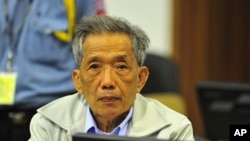The prosecution at Tuesday’s appeal hearing for Comrade Duch, the former head of the Khmer Rouge's notorious S-21 prison, has asked the United Nations-backed war crimes tribunal to increase the jail term it handed down last year.
March 29 marked day two of the scheduled three-day appeal court hearing for Comrade Duch, the Khmer Rouge’s former chief jailer, who has asked to be acquitted and released.
Last year, the United Nations-backed tribunal sentenced Duch to 35 years in prison but reduced the term to 19 years because of time served and other factors.
The lower court had found Duch responsible for the deaths of more than 12,000 detainees at S-21 prison, which he headed between 1976 and 1979.
Displeased prosecutor
On Tuesday, international prosecutor Andrew Cayley told the seven-judge Supreme Chamber bench that the lower court’s sentence was manifestly inadequate.
He pointed out Duch’s change of strategy in the final days of his 2009 trial, when the 68-year-old defendant asked the court to acquit and release him. That represented a stunning 180-degree turn, after nine months of Duch telling judges he was "guilty but sorry."
Cayley says the lower court was mistaken to have placed so much weight on mitigating circumstances.
He cited a number of areas in which he felt the lower court had been too generous - including Duch’s numerous expressions of regret which he feels were bogus.
"In respect of remorse: the accused’s continued requests for release underscores in a case like this - involving massive criminality - the fact that the accused, to this day, lacks real sincere remorse for what happened," Cayley said.
What Duch did
S-21 prison, which Duch oversaw for three years, was a secret center where the Khmer Rouge sent thousands of perceived enemies of the revolution.
An estimated 15,000 people were tortured and interrogated at S-21 and then killed after Duch signed their execution orders.
Despite that, Duch’s lawyers told the appeal hearing Monday that their client should be freed.
They claim that Duch's case does not fall within the court's mandate because he was not a senior leader of the Khmer Rouge. They say he should be acquitted and freed.
On Tuesday, Duch’s lawyers said their client was a man who had acted under duress, expressed remorse and had not benefited, personally, from his years spent running S-21.
The defense repeated that Duch had simply been following orders and that, if he had not done what he was told to do, he would have been killed. His lawyer went so far as to describe Duch as a good man.
Life term
Not surprisingly, the prosecution disagreed. Andrew Cayley says the appeal court should increase Duch's sentence because of the gravity of his crimes.
Cayley says the prosecution recognizes Duch is entitled to some time off as compensation for being held illegally by the Cambodian authorities for years before his trial.
"But we call for the imposition of a life term, reduced to 45 years simply to take account of that period of illegal detention," Cayley explained. "But, for the purposes of history, a life term must be imposed in this case for all of the reasons I have stated. "
Duch’s appeal is scheduled to conclude on Wednesday and represents his last chance for release.
The appeal chamber will deliver its verdict in June.
Prosecution Wants Increased Sentence for Khmer Rouge War Criminal Duch











